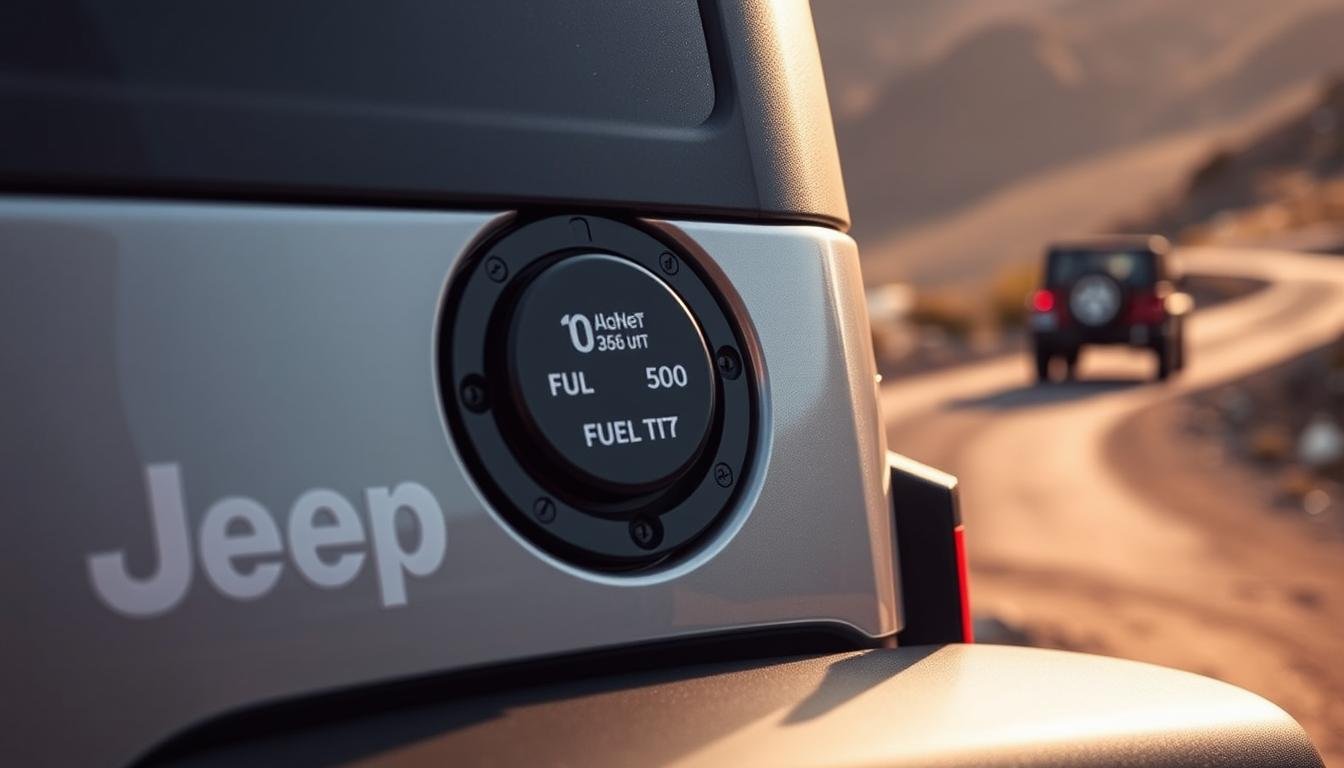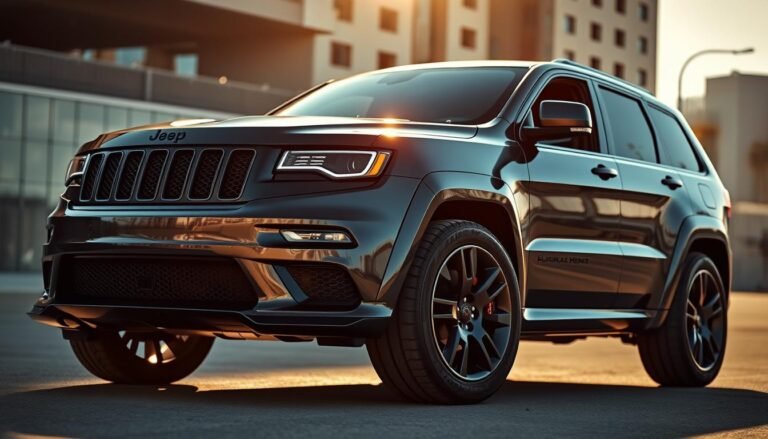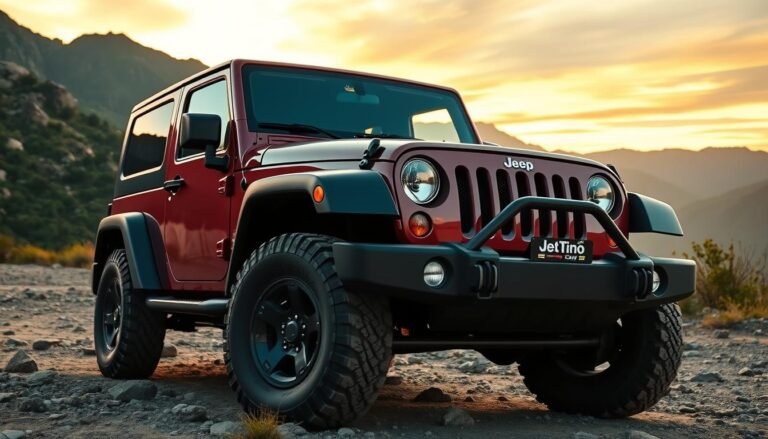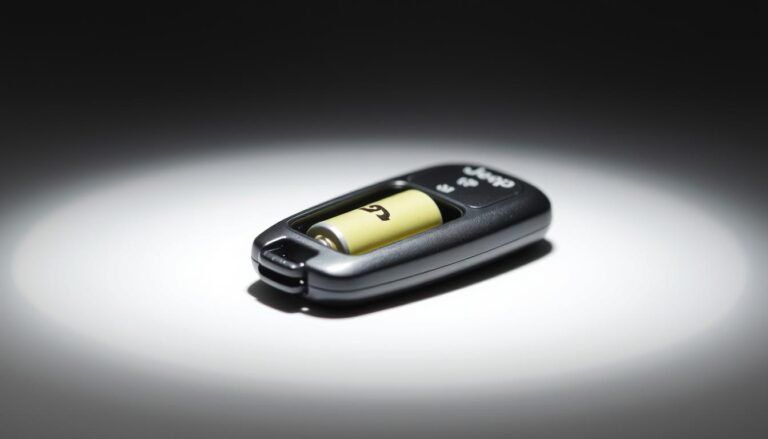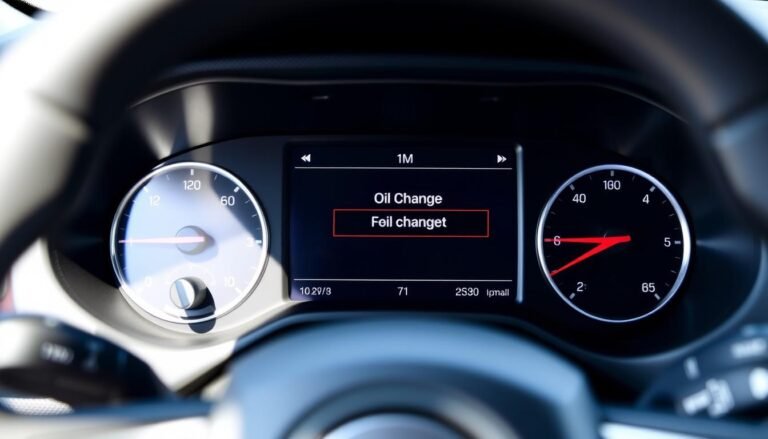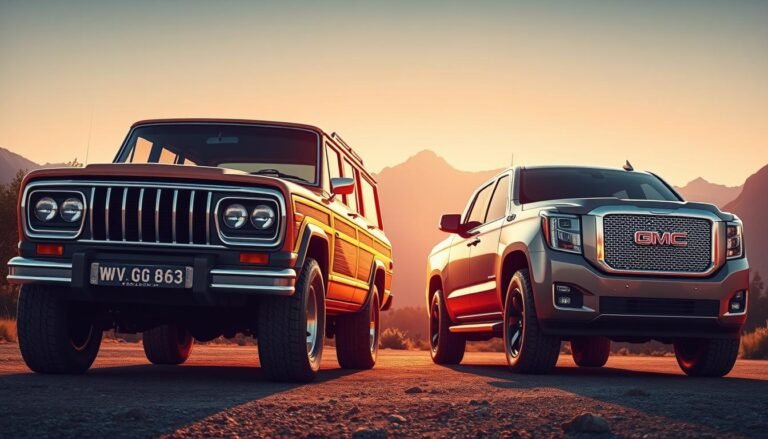What Kind of Gas Does A jeep wrangler Takes? Essential 9 Fuel Guide
What kind of gas does a Jeep Wrangler take? It usually needs regular unleaded gas. Yet, some models do better with premium.
Knowing the right Jeep Wrangler gas type helps keep it running well and saves fuel. This guide will teach you about different models’ fuel needs, helping you pick the best for your Jeep’s life.
The gas you choose affects how your Jeep drives, on roads or off. We’ll look at how regular and premium gas are different.
We’ll also see how engine choices change fuel needs, and share tips for the best performance.
By using this advice, you can make your Jeep work its best and get the most miles per gallon.
What is Jeep Wrangler Fuel Types?
Knowing the right fuel for your Jeep Wrangler is key for best performance. Regular unleaded gasoline works well for standard engines.
But, for those with performance models, premium gasoline is a must to get full power. The octane rating is vital to keep your engine healthy and boost off-road power.
Choosing the correct fuel makes sure your Jeep runs smoothly. This gives you the reliable performance expected from this iconic off-road vehicle.
| Fuel Type | Octane Rating | Recommended For |
|---|---|---|
| Regular Unleaded Gasoline | 87 | Base Model Engines |
| Premium Gasoline | 91+ | Performance Models |
Knowing the differences in fuel types helps you pick the right gas. This smarts lead to better engine work and a longer life. It ensures your Jeep Wrangler is always adventure-ready.
What Kind of Gas Does A Jeep Wrangler Take?
It’s critical to know the right fuel for your Jeep Wrangler to keep it running well. The engine type in your Jeep decides the kind of gas it needs.
This affects how well it works and how efficient it is. By understanding the fuel choices for your Jeep, you can pick the best gas. This keeps your engine in top shape and working great.
Overview of Gasoline Requirements
The Jeep Wrangler often comes with a 3.6-liter Pentastar V-6 engine. This engine does well with regular gasoline.
This fuel is not only good for everyday use but also keeps costs down. However, the HEMI V-8 and some turbocharged models need premium gas.
This higher-octane fuel boosts power and response, especially when you push the car hard.
Regular vs. Premium Gasoline
Choosing between regular and premium gas affects performance and engine life. Regular gas is fine if your Jeep has lower performance needs.
On the other hand, premium gas is best for high-performance Jeeps. It keeps them running smoothly.
Always follow the manufacturer’s advice to avoid engine problems and expensive fixes from wrong fuel use.
| Engine Type | Recommended Fuel Type | Performance Benefits |
|---|---|---|
| 3.6-liter Pentastar V-6 | Regular Gasoline | Cost-effective, sufficient for daily driving |
| HEMI V-8 | Premium Gasoline | Enhanced power, better performance under stress |
| Turbocharged Engines | Premium Gasoline | Improved efficiency and responsiveness |
Jeep Wrangler Engine Options
The Jeep Wrangler has different engine types to match your driving style and fuel needs. Knowing about these options helps you pick the best engine for you.
The 3.6-liter V-6 engine is a favorite option. It gives you about 285 horsepower and 260 lb-ft of torque.
This means plenty of power for city drives and off-road fun. It uses regular gas with an 87 octane rating, good for daily use.
If you want power but also care about fuel use, check out the 2.0-liter turbo four-cylinder.
With 270 horsepower and 295 lb-ft of torque, it’s efficient yet strong. It works great for those wanting a new take on classic power and uses standard gas.
For top power, the 6.4-liter HEMI V-8 engine is exciting. It pumps out 470 horsepower and 470 lb-ft of torque for serious drivers. It runs on high-octane gas, best for those putting power first.
Think about how you drive before choosing an engine. Each engine has benefits that affect how you enjoy your ride.
Fuel Efficiency Ratings For The Jeep Wrangler
The Jeep Wrangler’s fuel efficiency ratings show many options for different drivers. The 2024 model has various MPG figures based on the engine and setup.
Knowing these ratings can help you choose the right vehicle, especially if you care about fuel efficiency.
City and Highway MPG
The 2024 Wrangler with a 3.6L V-6 engine gets around 18 MPG in the city and 24 on the highway.
Meanwhile, the turbo four-cylinder engine does a bit better with about 20 MPG in the city and 23 MPG on the highway.
These numbers show how choosing your engine type affects your fuel economy.
Impact of Engine Type on Fuel Economy
Choosing your engine has a big effect on how much gas your Jeep Wrangler will use. Engine types, like the number of cylinders and whether it has forced induction, change your MPG.
For instance, the V-6 uses more gas than the four-cylinder. Also, the number of doors and the transmission type can change your fuel economy too.
| Engine Type | City MPG | Highway MPG |
|---|---|---|
| 3.6L V-6 | 18 | 24 |
| Turbo Four-Cylinder | 20 | 23 |
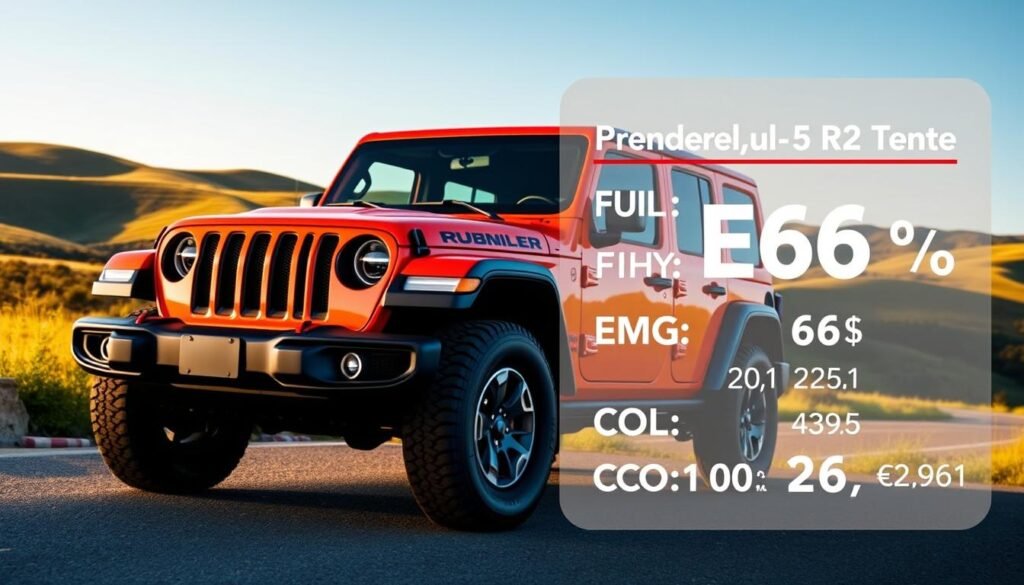
Jeep Wrangler Fuel Tank Sizes
Knowing the size of your Jeep Wrangler’s gas tank is key for your fuel planning. The two-door models have a 17.5-gallon tank. This size is perfect for city drives and quick trips.
The four-door Wranglers boast a 21.5-gallon tank. It’s great for long off-road journeys, reducing gas station visits.
If you opt for the Wrangler 4xe plug-in hybrid, it has a 17.2 gallon tank. This hybrid combines electric power with traditional fuel, giving you the best of both worlds.
Learning these tank sizes helps plan your drives better. With this info, you can fuel up correctly for any adventure, on or off the road.
Best Gas For Jeep Wrangler Performance
Choosing the right gas for your Jeep Wrangler is crucial. It impacts how well and long your Jeep runs.
Top-Tier gasoline, known for high-quality additives, is the best choice. It helps your Jeep’s engine stay clean and run smoothly.
Benefits of Using Top-Tier Gasoline
Top-Tier gasoline is set to high standards. Here are its perks:
- Enhanced Engine Cleanliness: Reduces deposit build-up in fuel injectors and intake valves.
- Improved Fuel Efficiency: Cleaner engines run more efficiently, leading to better mileage.
- Fewer Repairs: With cleaner fuel systems, the need for costly repairs diminishes.
- Greater Performance: Optimal fuel helps maximize your Jeep’s horsepower and torque.
Impact on Engine Longevity and Performance
Top-quality gasoline is essential, especially for Jeeps with powerful engines. High-grade fuel does wonders:
- Longer Engine Life: Reduces wear and tear on engine components.
- Better Off-Road Capability: Consistent performance under demanding conditions.
- Optimal Power Output: Ensures you get the most out of your Jeep Wrangler’s capabilities.
For top-notch performance and reliability, stick to Jeep Wrangler’s fuel guidelines. Choose Top-Tier gasoline for major benefits to your vehicle.
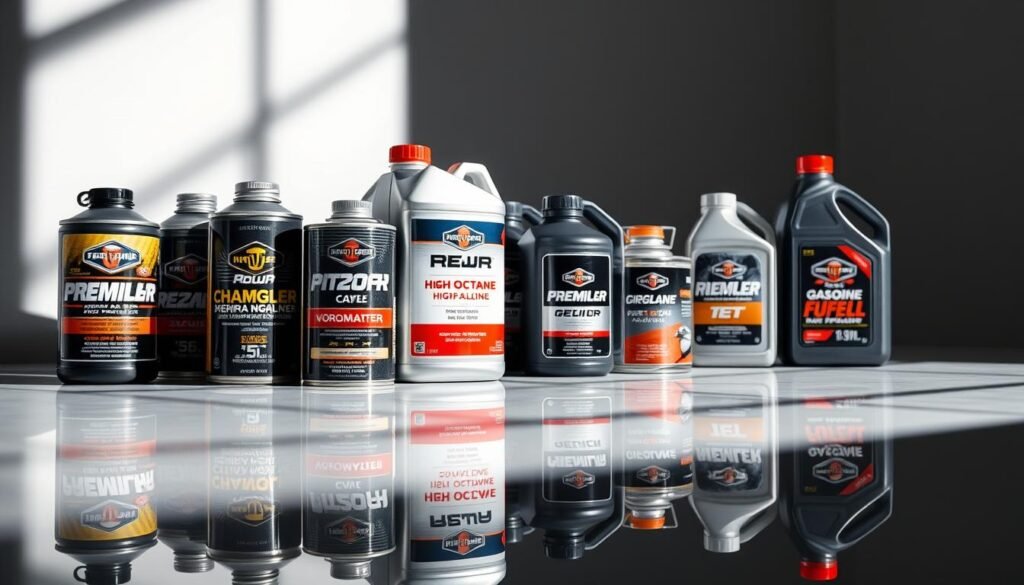
Jeep Wrangler Fuel Requirements by Model
It’s very important to know the fuel needs of your Jeep Wrangler. This knowledge helps keep your Wrangler running well and avoids damage.
Each model requires a certain type of fuel based on its engine.
Differences Among Various Engine Types
Jeep Wrangler models have different engines that need specific fuels. Here’s a look at what each popular model needs for fuel:
| Model Year | Engine Type | Fuel Type | Octane Rating |
|---|---|---|---|
| 2021 | 3.6L V6 | Jeep Wrangler gasoline | 87 (Regular) |
| 2021 | 2.0L Turbo I4 | Jeep Wrangler gasoline | 87 (Regular) |
| 2021 | 2.2L Turbo Diesel I4 | Diesel | N/A |
| 2022 | 3.0L EcoDiesel V6 | Diesel | N/A |
| 2022 | 6.4L V8 | Jeep Wrangler gasoline | 91 (Premium) |
Make sure to use the right fuel for your Jeep Wrangler model. Using the correct fuel type improves your vehicle’s performance and life.
Learning Octane Ratings
For your Jeep Wrangler, knowing octane ratings is key for its best performance. The octane rating shows how well gasoline can avoid knocking during burning.
Usually, regular gas has an octane rating of about 87, while the premium kind often goes above 91. Knowing the right gas for a Jeep Wrangler helps make smart fuel choices.
Using the recommended octane rating keeps your engine running well and efficiently. If your engine needs higher octane but gets lower, it might not burn as well.
This could hurt how well your engine works and how long it lasts. The Jeep Wrangler’s octane rating is big for its performance.
Higher octane gas burns better, especially when the engine works hard, like during towing or off-roading.
So, picking the right gas keeps your Jeep Wrangler running great and doing what it should.
| Gasoline Type | Octane Rating | Typical Use |
|---|---|---|
| Regular | 87 | Standard engines, most daily driving |
| Mid-Grade | 89 | Some high-performance vehicles |
| Premium | 91+ | High-performance and luxury vehicles |
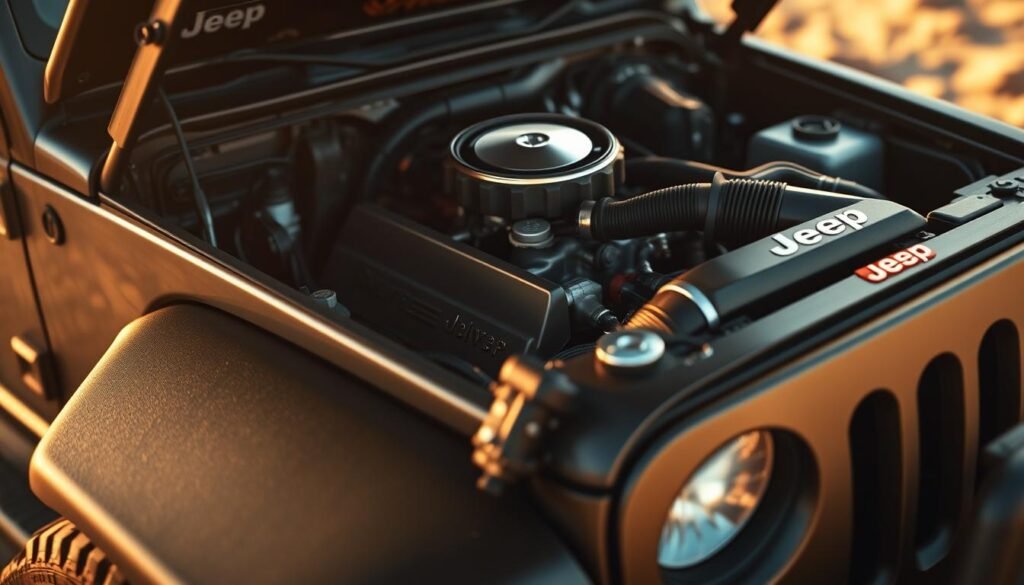
Cost Considerations For Jeep Wrangler Fuel
Having a Jeep Wrangler means knowing how fuel types affect your budget. The price of Jeep Wrangler gasoline changes a lot.
This depends on if you pick regular or premium gas. Choosing better-grade gas might boost performance but will cost more over time.
Let’s check out the average prices for regular and premium gas in the U.S.:
| Fuel Type | Average Price per Gallon |
|---|---|
| Regular Gasoline | $3.50 |
| Premium Gasoline | $4.00 |
It’s key to figure out your Jeep’s fuel spending. Let’s say your Jeep gets about 20 miles per gallon.
And you drive 12,000 miles a year. You can find the fuel cost by seeing how many gallons you need. Then multiply that by the cost of the gas you choose.
- Annual mileage: 12,000 miles
- Fuel efficiency: 20 MPG
- Annual gallons needed: 600 gallons
- Cost for Regular: $2,100
- Cost for Premium: $2,400
Picking the right gas for your Jeep is important. It’s not just about how well the car drives. It also helps you save money in the long run.
The right gas choice helps you keep a good balance. It keeps your car running well without costing too much.
Jeep Wrangler Fuel Recommendations
To make your Jeep Wrangler run its best, using the correct fuel is very important.
Knowing the right fuel for your specific Jeep model boosts performance and keeps the engine going longer.
Always look in your owner’s manual for the info that matches your model. If you want the best for your Jeep Wrangler, stick to mid-grade or premium gas.
This is especially true for the powerful engine models. This type of fuel helps your engine run smoother, giving you more power and better performance.
For Jeeps with turbocharged engines, premium gas is a must to keep up the power and avoid engine problems. Choosing the right fuel also means picking gas with quality additives.
These additives keep the fuel system clean which helps your engine run better and use less gas. Using this gas regularly will also help your Jeep’s engine last longer.
Here’s a summary of fuel recommendations based on different Jeep Wrangler models:
| Model Year | Recommended Fuel Type | Octane Rating |
|---|---|---|
| 2018 – Present | Premium | 91+ |
| 2012 – 2017 | Mid-Grade | 87+ |
| 2007 – 2011 | Regular | 87 |
The right fuel makes a big difference in how your Jeep Wrangler performs. Following these fuel suggestions can help your Jeep run better and keep the engine healthy for a long time.
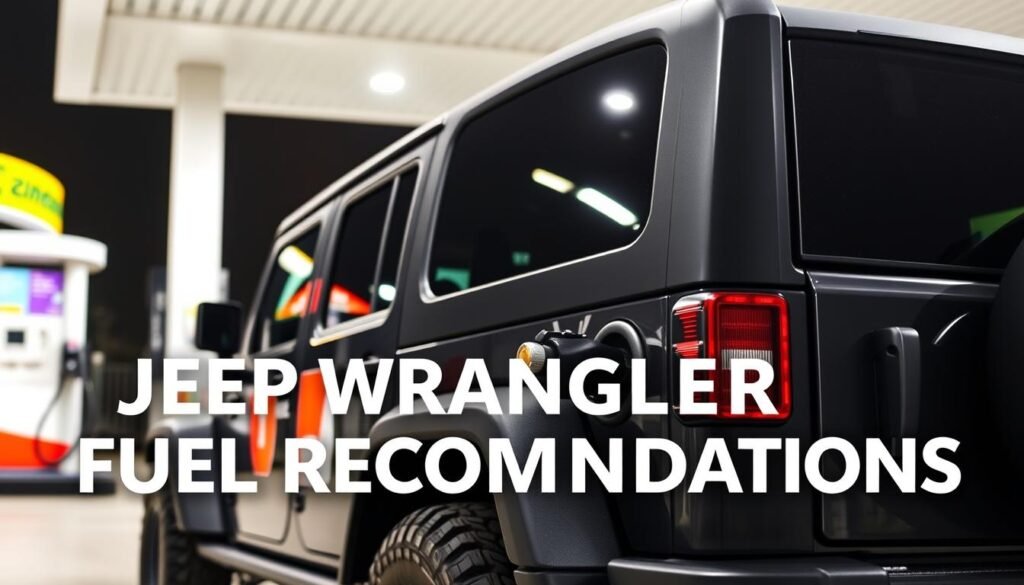
Maintenance Tips For Optimal Fuel Efficiency
Keeping your Jeep Wrangler in good shape does more than just improve how it runs. It also helps with gas mileage. By following top maintenance advice, your car will operate more efficiently.
This results in better mileage and less money spent on gas. Keeping the engine and its parts clean is key to using less fuel.
Regular Engine Checks
Checking your engine often helps spot problems early. Keep an eye on important parts like belts, spark plugs, and the ignition.
This keeps your engine working its best, which is vital for fuel efficiency in your Jeep Wrangler.
Make sure these inspections are done as the maker suggests to keep your vehicle in top shape.
Importance of Air Filters and Oil Changes
Having a clean air filter is crucial for smooth airflow to the engine. If the air filter is dirty, your car won’t run as well and will use more gas.
Change your air filters regularly for better engine work and more power. Changing the oil as advised is just as important.
New oil lowers friction and makes your engine work better, which means you’ll use less gas.
| Maintenance Task | Recommended Frequency | Impact on Fuel Efficiency |
|---|---|---|
| Engine Check | Every 3,000 miles | Ensures optimal performance |
| Air Filter Replacement | Every 15,000 miles | Improves air intake and combustion |
| Oil Change | Every 5,000 miles | Reduces engine friction |
Conclusion
Knowing the correct gas for a Jeep Wrangler is key to getting the most out of it. This guide has shown you the difference between regular and premium gas.
These facts help you pick the right gas, so your Jeep runs smoothly. Choosing the suitable gas for your model can save you both time and cash.
The right fuel choice does more than boost performance. It also helps your engine last longer.
Keeping up with upkeep and smart fuel picks leads to better drives. As a Jeep Wrangler owner, these tips let you connect more with your vehicle.
By choosing the right fuel and focusing on efficiency, you’re set for more adventures. Get ready to unleash the full potential of your Jeep.
FAQs
Q: What kind of gas does a Jeep Wrangler take?
A: Jeep Wranglers need regular unleaded gas. But, if you have a HEMI V-8 or a turbo engine, you might need premium gas to get the best performance.
Q: What are the fuel types suitable for Jeep Wranglers?
A: Jeep Wranglers work well with regular gas. Yet, if you have a performance engine, premium gas keeps it running smoothly.
Q: What is the octane rating needed for a Jeep Wrangler?
A: Regular Jeep Wranglers need at least 87 octane gas. But, for more power, get premium gas with an octane rating over 91.
Q: How much fuel do different Jeep Wrangler models hold?
A: A two-door Jeep Wrangler has a 17.5-gallon tank. Four-door models can hold 21.5 gallons. The hybrid model has a 17.2-gallon tank.
Q: What are the fuel efficiency ratings for the Jeep Wrangler?
A: The 2024 Jeep Wrangler’s 3.6L V-6 engine gets about 18 MPG in the city and 24 on the highway. The turbo four-cylinder gets 20 city and 23 highway MPG.
Q: Why should I consider using Top-Tier gasoline for my Jeep Wrangler?
A: Top-Tier gas has better additives. It keeps your engine clean, helps it run longer, and improves fuel efficiency, especially in high-performance models.
Q: What maintenance practices support fuel efficiency in Jeep Wranglers?
A: To keep your Jeep Wrangler fuel-efficient, do regular engine checks. Make sure the air filter is clean, and change the oil on time. This keeps your vehicle at its peak performance.
Q: How do I choose the best gas for my Jeep Wrangler?
A: Check your Jeep Wrangler’s fuel needs. Regular gas is fine for many, but some models need premium gas for the best performance.

